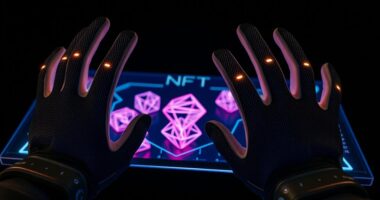Metaverse DAOs let you join communities that own, govern, and develop virtual cities on the blockchain. Using blockchain technology, these decentralized organizations enable you to participate in decision-making, landownership, and resource management transparently and securely. Virtual land is represented as NFTs, giving you true digital property rights. Governance is automated through smart contracts, ensuring trust and democracy as the community grows. To discover how these digital cities work and how you can get involved, keep exploring the options available.
Key Takeaways
- DAOs enable decentralized governance of virtual cities, allowing community members to make collective decisions on land use and development.
- Blockchain-based ownership via NFTs grants true digital property rights for virtual land within community-owned metaverse cities.
- Smart contracts automate voting and rule enforcement, ensuring transparent, secure, and tamper-proof governance processes.
- Digital real estate in these DAOs is dynamic, supporting marketplaces, social hubs, and community-driven projects responsive to member needs.
- Enhanced cybersecurity and blockchain transparency foster trust, protecting digital assets and strengthening community ownership.

As the metaverse continues to expand, decentralized autonomous organizations (DAOs) are emerging as a key way for communities to govern virtual worlds collaboratively. These DAOs enable users like you to participate in virtual governance, making collective decisions about how digital spaces are managed and developed. Instead of relying on centralized authorities, DAOs leverage blockchain technology to guarantee transparency and decentralization. This means that every member, including you, can have a say in shaping the virtual environment, from setting rules to allocating resources.
DAOs empower communities to govern virtual worlds transparently and collaboratively through blockchain technology.
In the context of digital real estate, DAOs are transforming how virtual land is owned, bought, and sold. You can acquire parcels of digital real estate, which are represented as non-fungible tokens (NFTs), giving you true ownership on the blockchain. But it’s not just about holding property; it’s about actively participating in decisions about the development and usage of that space. Through a DAO, you and other landowners can vote on projects, community initiatives, or governance policies that affect the virtual neighborhood. This collective decision-making fosters a sense of community ownership and aligns interests across members.
Virtual governance within these DAOs operates through smart contracts that automate rules and voting processes. When you cast your vote, it’s securely recorded on the blockchain, ensuring transparency and immutability. This system prevents any single entity from wielding undue influence, so your voice genuinely counts. As more people join, the DAO’s decision-making becomes more democratic, giving rise to community-owned cities where governance is truly decentralized. These cities can grow organically, with residents collaboratively deciding on infrastructure, events, or policies, all on the blockchain.
Additionally, digital real estate within these community-owned cities isn’t static; it’s dynamic and responsive to the community’s needs. You might see virtual marketplaces, social hubs, or entertainment districts emerge based on collective input. The ownership of digital real estate through DAOs also means that your investments are more than just virtual assets—they’re part of a living, breathing community. You can participate in funding projects, hosting events, or even proposing new land developments, all governed by the rules set by the community. Moreover, integrating cybersecurity solutions can enhance the safety and trustworthiness of these digital assets and governance systems.
Frequently Asked Questions
How Do Metaverse DAOS Generate Revenue?
You can see that metaverse DAOs generate revenue through their virtual economy, where users buy, sell, and trade digital assets. By leveraging tokenomics, they create value and incentives for participation. As members invest in virtual land, NFTs, or services, the DAO earns transaction fees or appreciation in token value. This cyclical process sustains the community, encouraging growth and innovation within the digital city.
What Security Measures Protect DAO Members’ Assets?
You’re probably wondering how DAO members’ assets stay safe. Smart contract security is essential, as it ensures the code governing transactions is free from vulnerabilities. Additionally, asset insurance provides a safety net, protecting your investments if something goes wrong. By combining robust smart contract audits with insurance policies, DAOs create a more secure environment, giving you peace of mind that your assets are protected against potential threats or failures.
Can Non-Technical Users Participate in Governance?
You can definitely participate in governance even if you’re not technical. User onboarding tools simplify the process, guiding you through voting and decision-making. Community engagement platforms provide clear information and easy ways to stay involved. These features make it accessible for everyone, encouraging diverse voices. So, whether you’re tech-savvy or not, you can actively shape the community’s future and have a say in governance.
How Are Disputes Resolved Within Metaverse DAOS?
Dispute resolution in metaverse DAOs relies on governance mechanisms designed to handle conflicts. You can participate in voting or propose solutions to resolve disagreements. Often, these DAOs use transparent protocols like arbitration systems or community moderation to settle disputes equitably. By engaging in governance processes, you help guarantee that conflicts are addressed openly and efficiently, maintaining trust and harmony within the digital community.
What Future Developments Are Expected for Metaverse DAOS?
You might see future developments in metaverse DAOs focusing on expanding virtual real estate options and avatar customization, making experiences more immersive and personalized. As technology advances, expect more seamless governance tools, enabling members to participate actively in decision-making. These innovations will likely foster stronger community engagement, creating richer virtual worlds where users have increased control and expression, shaping the evolution of decentralized, community-owned digital spaces.
Conclusion
As you explore the world of Metaverse DAOs, you’ll see how community-owned cities on the blockchain are reshaping digital interaction. These decentralized organizations empower you to actively participate in shaping virtual spaces, making ownership and governance more accessible. By joining these DAOs, you become part of a growing movement that blurs the line between real and digital communities. Embrace this innovative frontier and take control of your virtual future today.









